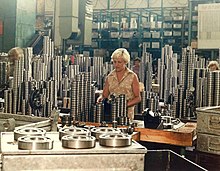
This method of product and price marketing can be replicated across into other industries. Within the materials handling and castors supply industries similar trends of price value marketing can be seen. Castors can range from value castors, which bought in quantity, offer the end consumer the best value for money. Budget castors offer such value for money in this price sensisitive market in which we operate. At the other end of the scale, are industrial castors, that are able to withstand greater weight loads and usage, these are wroth their premium price. It’s the old adage that you get what you pay for. In the middle of the scale are medium duty castors that are competitively priced for today’s market.
One of the first commentators was a gentleman named Adam Smith who in 1776 described the Industrialisation of Nations, and how the division of labour would produce increases in productivity. The British Industrial revolution saw the mass manufacturing of castors and wheels in the United Kingdom. Traditionally British manufacturers of castors and wheels, such as Flexello and Revvo Castors dominated the home market. However just as Adam Smith predicted, as the markets grew, and the process of division labour developed, How To Become An Electrician In Alabama cheaper castors and wheels were imported from countries with economical manufacturing, material and labour costs. Castors manufacturing developed in Europe, in Italy and Germany for example. Over the last ten to twenty years China has become one of the leading castors manufacturers. With cheap material costs and labour costs the Chinese market has grown considerably. The only draw back with such value castors is the length of time they take to get to our shores! It is indeed a slow boat from China!
So any modern castors distributor must take these market changes into account. Castors and wheels, like in supermarkets, must meet all customers’ requirements from cheap value castors up to heavy duty industrial castors. Adam Smith in 1776 may have been one of the first to write about the Industrialisation of Nations, however in today’s Pricing Problems Of Industry market this simplistic view has been overtaken by a price and value castors marketing strategy. Casting the net far and wide enables castors manufacturers to catch all the castors requirements from customers. Whether its value budget castors, sensitively priced or whether it’s a heavy duty fabricated castor, able to take more strain.
